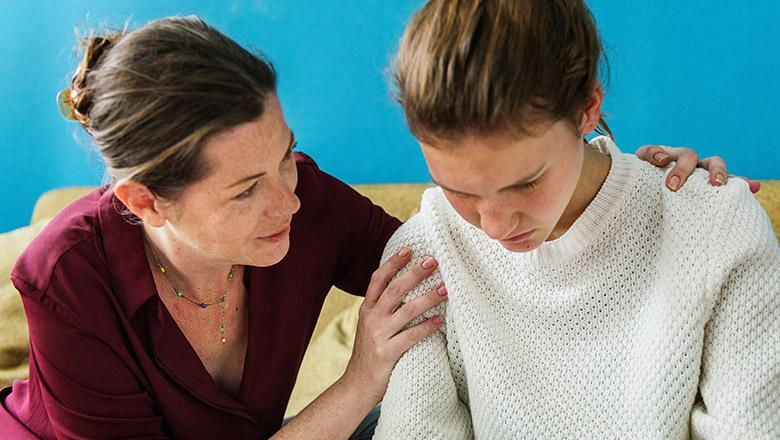Building resilience in teens and children will help prepare them for adulthood, and parents have an important role to play in this development.
Resilience for teens and children can be challenging though. Especially when you think about all the emotional ups and downs and difficult situations they face whilst growing up. From lost soccer matches to disappointing grades, or exclusion from friendship groups, there’s a lot to cope with.
So, how do you build resilience in a teenager or child to ensure they can bounce back from these situations? We talked to Dr Karyn Healy, psychologist and honorary principal research fellow at UQ’s Parenting and Family Support Centre, to find out.
Why is resilience in teenagers and children important?
Building resilience in teens and children can help them overcome life’s setbacks and maintain healthy relationships.
“Everyone experience setbacks, disappointments and distressing events at some stage – this is simply part of life,” says Karyn.
Parents have a natural inclination to keep their children safe and protect them from the emotional turmoil that these types of situations can cause. But according to Karyn, this can also hamper the development of resilience in teenagers and children.
“Most parents are naturally protective of their children and this in general helps keep children safe,” she says.
“However, if parents shelter children from all disappointments and hardships, they may deny children the opportunity to learn to cope and adjust in response to problems – which is an important life skill.”
Focusing instead on helping your child develop the skills necessary to navigate and overcome these situations is more beneficial for their welfare in the long run.
“Parents are in an ideal position to support and coach children in managing emotions and coping with these disappointments,” says Karyn.
“Learning to cope with everyday concerns can help children gain confidence and skills in coping with setbacks throughout life.”
Karyn also points out that learning resilience can lead to healthier and more fulfilling relationships, which, in turn, strengthens future resilience capabilities.
“All relationships have their highs and lows,” she says.
“Being able to keep and strengthen friendships and relationships over time depends on being able to get through the difficult times and overcome conflict, as well as enjoying the good times.”
Situations where resilience in teens and children can be helpful
Other than the obvious everyday disappointments like losing at a game or performing below average in a test, Karyn explains that problems with relationships can be a key cause for distress in teens. This may include:
- conflict with friends, family or teachers
- feeling left out
- struggling to find a friendship group
- problems with early romantic relationships.
These types of relationship problems can occur both in person and online, and it can be difficult to avoid them. So, having the skills necessary to navigate situations where conflict arises and causes distress is essential.
Bullying and resilience in teens and children
Bullying is another major cause of distress in children and teens, where it can be particularly difficult for them to learn to ‘bounce back’. Karyn has conducted extensive professional practice and research in the area of peer bullying among children and teenagers, and she emphasises that parental support is integral in these situations.
“Being bullied by peers can have very serious mental health impacts,” she says.
“However, the problem is often left for schools to deal with.”
“School bullying prevention programs can only do so much, and in some cases may even make things worse.”
“The way children are parented makes a difference to both whether they are targeted for bullying and the mental health consequences,” says Karyn.
“There are many ways parents can help their child to cope with bullying, including listening to their child, helping their child to make a plan, and following up with the school if the issue persists or is of a serious nature.”
Now that we’ve recognised why resilience is important, and when it can be helpful, let’s find out how to build resilience in a teenager or child.
How do you build resilience in a teenager or child?
When considering how to raise a resilient teenager or child, it’s important to remember that there are many interplaying components that affect individuals differently. For example, many teenagers may also experience depression, anxiety or other mental health challenges. Karyn explains that while these things can certainly impact confidence and the ability to be resilient, parents can still help their child learn to manage their emotions and overcome problems.
“In other words, we don’t need to wait until a child is ‘confident’ or has ‘high self-esteem' to teach them to cope,” she says.
“Instead, by learning how to cope with their emotions and manage everyday problems, children can build their confidence and capacity to manage future setbacks and problems.”
So, what do you need to do as a parent to help your child or teenager become more resilient?
Karyn has broken it down into three main steps.
- Accept that children will not always be happy and allow them to experience reasonable disappointments sometimes – and learn that they can cope with this.
- Simply be there for them, and with them, in times of distress – listen and try to understand and accept the situation without taking over.
- When your child is ready to do so (after they are more settled following distress), help them work out what they want to do about the situation (if anything). Help make your child aware of options and encourage them to weigh these up and decide what to do.
You can implement these strategies by encouraging child and teenage resilience activities in your home.

Resilience activities for teens
Karyn has suggested the following activities for developing resilience in your child or teenager:
- Coach your child in solving problems with siblings. There are many everyday situations like who has the first shower, who sits in the front seat of the car, or who gets dropped off first that can cause conflict between siblings. Choose a time to discuss the issue when everyone is calm and strive for a solution that is fair for everyone.
- Coach your child to manage problems with peers. This starts with listening (without taking over) and helping your child come up with options. You can then encourage them to choose what will work best for them.
- Demonstrate to your child how to manage life’s little disappointments (like losing a game, not being selected for a team, not being invited to a party) by showing how you do this. For instance, if you miss out on a job you wanted, you might say “I’m disappointed because I really wanted this job. However, I can see from the feedback I got what I could do better next time.”
- Support your child’s involvement in activities and games where they can practise how to accept losing as well as how to win gracefully and how to work together as a team.
- Help children to have positive outlook and be appreciative for what they have. This doesn’t mean looking at the world through rose-coloured glasses or denying problems – it means recognising the potential for positive. Parents can help children learn to be optimistic by modelling it themselves. One way to do this is to add a sentence starting with “at least” after a negative statement. For example, “I’m really upset that our car was so badly damaged. At least no one was badly hurt.”
What to do when your teen is finding it difficult to bounce back
Some teens and children find it challenging to bounce back from distressing or difficult situations. Resilience isn’t something that can be learned overnight, and individuals develop resilience skills at varying paces.
“It’s normal for children and teenagers to experience a full range of emotions – positive and negative.” says Karyn.
“Everyone is different in how they process distressing events, and it is not unusual for children and teenagers to continue to revisit and process events over time.”
Karyn explains that focusing on the things you and your child can control may help.
“To support your child, maintain the usual routine as much as possible (or re-establish a new routine if the old routine is no longer helpful) – this includes, first and foremost, an effective sleep routine as well as a morning routine for getting ready for school,” she says.
“Be there to listen to them and encourage them to make decisions about what to do to feel better and engage in friendships, school and activities.”
However, some situations may require professional help.
“If your child’s low mood or distress persists for a month or more – or if you ever think they are at risk of self-harm – consult your GP or mental health specialist.”
Dr Karyn Healy is a psychologist with extensive experience supporting schools, parents and children in preventing and addressing bullying, and resolving conflict.
“I am interested in the effects of relationships on the wellbeing and mental health of children and teenagers. This includes how to minimise the harmful impacts of bullying by peers (and siblings) and conflict with friends and family.
“I am also interested in how to help children and teenagers develop effective supportive relationships with peers and in their family.”
Karyn is co-author of Resilience Triple P program, a family program to address school bullying. She also conducts ongoing research at the Parenting and Family Support Centre and QIMR Berghofer Medical Research Institute into interventions to address school bullying, and the role of parents in improving outcomes for children and teenagers victimised by peers.
Looking for ways to help your teen with their mental health? Discover mental health resources your teen can use to improve their overall wellbeing.






